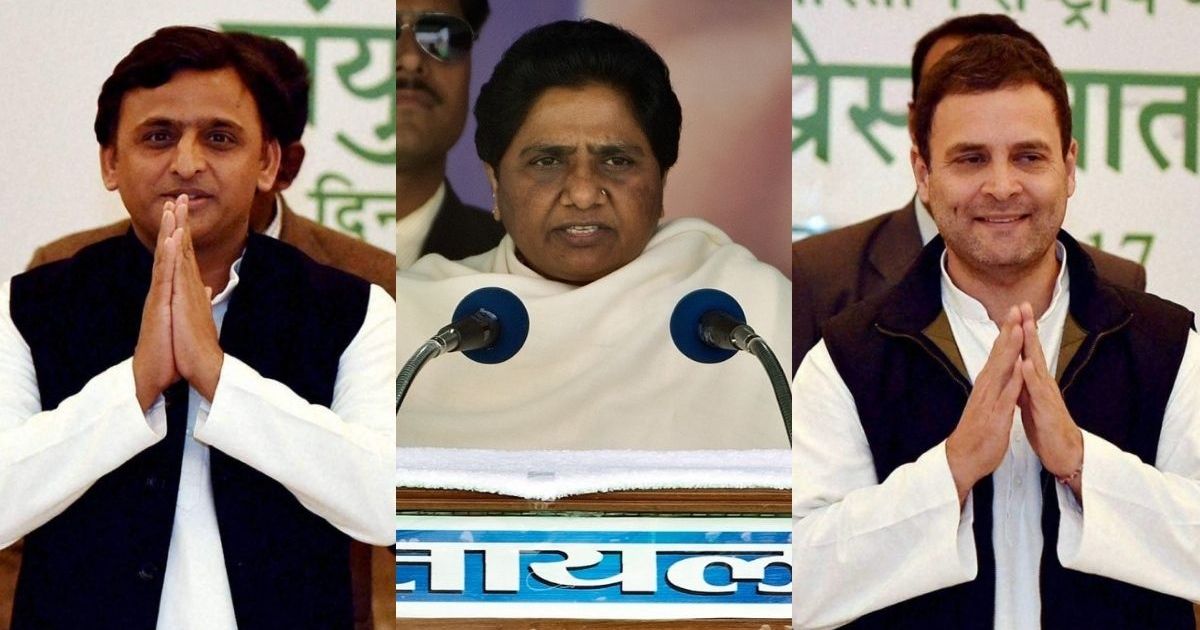
The attempts by Opposition parties to forge a common front will face its first test in Uttar Pradesh in April, when the election to 10 Rajya Sabha seats will be held.
Though the seats will fall vacant only two months from now, there is already a buzz in political circles about whether the Samajwadi Party, the Bahujan Samaj Party and the Congress will sink their differences and join hands to put up a common candidate in this election.
Of the 31 members from Uttar Pradesh in the Rajya Sabha, the term of nine members is slated to end on April 2. In addition, BSP chief Mayawati had resigned from her seat in July. As a result, there will be 10 vacancies from the state in the Upper House. Among those retiring include six Samajwadi Party members, Naresh Aggarwal, Jaya Bacchhan, Kiranmoy Nanda, Alok Tewari, Munawar Salim and Darshan Singh Yadav, BJP member Vinay Katiyar, the BSP’s M Ali and Pramod Tewari of the Congress.
With 312 seats in the Uttar Pradesh Assembly, the BJP is in a comfortable position to win eight seats in the Rajya Sabha poll, while the Samajwadi Party, which had a substantial presence in the Upper House so far, can win only one as its strength in the Assembly has been reduced to 47. The Opposition can bag the 10th seat if it decides to pool its surplus votes for a common candidate.
Leaders of the three main Opposition parties maintain it is still too early to discuss the possibility of forging a united front for this election. Samajwadi Party leader Ram Gopal Yadav said his party will be happy if the BSP agrees to support its candidate while BSP leader Satish Sharma said party chief Mayawati is yet to take a view on this matter. Congress leaders maintained that since it is only a bit player in Uttar Pradesh, it is up to the other two parties to take the initiative.
Though the three main Opposition players appear ambivalent on this issue, a senior Congress leader from Uttar Pradesh admitted that if all Opposition parties put up a common candidate in the Rajya Sabha election, it will not only have an impact on the bye-elections in the Gorakhpur and Phulpur Lok Sabha seats but could well set the stage for the bigger and more crucial battle ahead in the 2019 general elections. The two Lok Sabha seats in Uttar Pradesh fell vacant after Chief Minister Adityanath and deputy chief minister Keshav Prasad Maurya resigned from the Lok Sabha to take over their new assignments in Lucknow last year.
Opposition unity
Talk of Opposition unity gained ground in recent days after United Progressive Alliance chairperson Sonia Gandhi presided over a meeting of 17 Opposition parties last week where she stressed the need for them to take a united stand on matters of national importance both inside and outside Parliament.
However, the absence of the BSP at this meeting raised serious questions about this exercise. With a year to go for the next Lok Sabha election, it has become necessary for Opposition parties to begin planning their moves if they are serious about taking on the BJP. While acknowledging this fact, Opposition leaders also pointed out that the success of this proposed joint front will centre around the electorally-important state of Uttar Pradesh where the BJP won as many as 72 of the 80 Lok Sabha seats in the 2014 general election and a landslide in the Assembly elections last year. The Opposition can only hope to weaken the BJP here if it puts up a united fight. But a viable alliance will only be possible if Mayawati is on board. Though political pundits wrote her off after her party’s dismal performance in the state in the last Lok Sabha and Assembly polls, Mayawati continues to be a key player as her Jatav support base remains intact.
“Mayawati’s participation in the alliance can make a difference in as many as 50 seats,” remarked a senior Trinamool Congress leader. He said West Bengal chief Minister Mamata Banerjee has been in touch with Mayawati but the Congress should also be more flexible in dealing with the BSP chief. For instance, it could have given a couple of seats to the BSP in the Gujarat Assembly polls to demonstrate that it is serious about building partnerships. Opposition leaders underlined that the future of a united Opposition front hinges primarily on Mayawati.
Tactical silence
Soon after the declaration of the Uttar Pradesh Assembly polls, both Samajwadi Party chief Akhilesh Yadav and Mayawati had publicly declared that they would be willing to set aside their differences and work together in the future.
However, Yadav has since announced that his party does not favor an alliance, while Mayawati has been silent on this issue. BSP leaders said that after her party’s success in civic elections in Uttar Pradesh in December, Mayawati is keeping her options open. Both Yadav and Mayawati would first prefer to maximize their gains on the ground so that they can drive a hard bargain if it comes to seat-sharing negotiations. More importantly, Opposition leaders are wary of opening their cards too soon in view of the court cases being pursued against them, especially after the BJP made an example of Rashtriya Janata Dal chief Lalu Prasad Yadav who is currently in jail in connection with the fodder scam. The BJP obviously has a vested interest in ensuring that the Opposition camp remains a divided house.
[“Source-scroll”]





